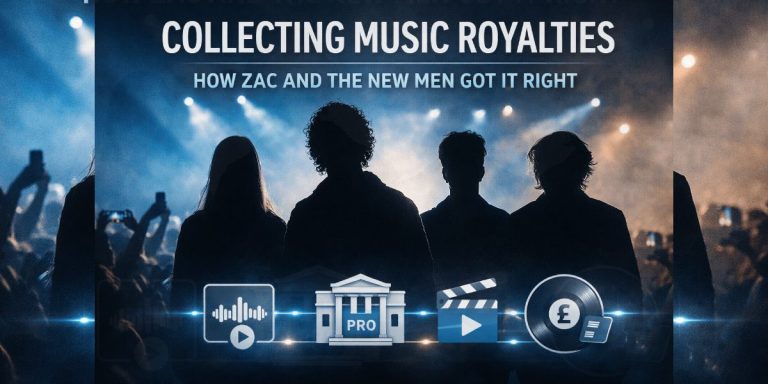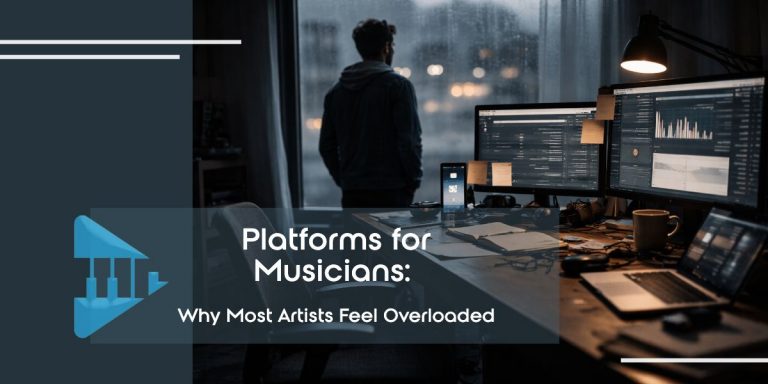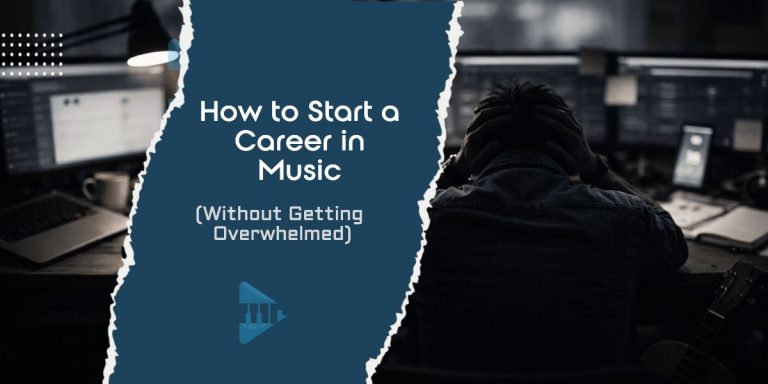Table of Contents
ToggleVideo Game Music Submission: How to Get Your Music Into Games (and Get Paid)

TL;DR (Key Summary)
If you’re tired of guessing how to break into game music, here’s the short version. You’ve got two main ways to get your tracks into games:
- Pitch directly to developers.
- Use licensing platforms that game studios already trust.
Indie studios are easier to approach. You’ll find them on Discord, Itch.io, and at events like Global Game Jam. AAA studios are tougher to crack, but when they say yes, the pay jumps.
Send game-ready tracks every time. That means stems, loopable versions, clear filenames, and proper metadata. And don’t stop at the upfront sync fee. Registered rights keep earning long after the game ships. Too many composers skip this step and leave money behind.
You can track all this yourself, but it takes work. Or you can use a platform like Melody Rights to handle the heavy lifting while you focus on making music.
Why Submission Is More Than Just Pitching
You’ve probably sent out demos before, crossed your fingers, and waited. Most of us have been there. Developers want more than a cool track. They need music that reacts to gameplay, files that drop smoothly into their engines, and a composer who understands the business side.
The video game industry pulled in $184 billion in 2023 and grew slightly to $187.7 billion in 2024. The game music market was worth $1.64 billion in 2024 and is expected to reach over $3 billion by 2033. There’s serious money here, but only if you approach it with a plan.
You’re not just chasing one placement. You’re building a track record and royalties that keep paying long after the game launches. Landing that first gig feels incredible, but knowing checks still arrive two years later? That’s the real win.

What Developers Want (AAA vs Indie and Genre Needs)
Game studios aren’t all the same, so you can’t pitch them the same way. AAA and indie studios look for different things, and knowing that can make or break your pitch.
Quick Note: What’s AAA?
AAA means big-budget, blockbuster game studios, like Call of Duty or Final Fantasy. They have strict guidelines, huge teams, and expect polished, cinematic scores.
| Studio Type | Music Style Needs | Budget | Creative Freedom |
| AAA Studios | Big cinematic scores, layered adaptive tracks that change with gameplay | $200M+ total budgets | Low, strict style guides |
| Indie Studios | Experimental, retro-inspired, or genre-bending music | $10K–$500K total budgets | High, more room to experiment |
Match the Music to the Game
- Action Games: Fast, loopable tracks that build intensity
- RPGs: Emotional themes and ambient world-building pieces
- Horror: Creeping tension, layered soundscapes that react to the player
- Sports: High-energy beats, sometimes licensed pop or hip hop
If you can show a studio that you understand the tone of their game, you’ll stand out immediately. Don’t just send a generic reel. Pick a few tracks that feel like they already belong in their world.
Networking and Events: Where to Meet Developers in Person
If you’re just starting out, nothing beats meeting developers face to face. These events are beginner-friendly and packed with opportunities:
- Game Developers Conference (GDC) – The biggest annual event in the industry, great for learning how studios work and what they look for in music.
- GameSoundCon – Focused entirely on game audio. Perfect if you want to meet other composers and sound designers.
- MAGFest (Super MAGFest) – A celebration of video game music and culture. Great for networking in a relaxed, community-focused setting.
- Global Game Jam or local game jams – Fast-paced weekend events where you can meet indie developers, make quick soundtracks, and build your portfolio while working side by side with a team.
Even one good connection at these events can turn into multiple projects later.
The Pay Reality: What Composers Earn in 2025
Video game music pays across a wide range, depending on your experience, the size of the project, and whether you negotiate royalties or take a one-off buyout.
| Experience Level | Typical Rate (Per Finished Minute) | Project Type |
| Beginner / Student | $50–$150 | Small indie, game jams |
| Indie Professional | $100–$400 | Indie RPGs, mobile games |
| Experienced Composer | $300–$1,000+ | AAA or cinematic RPGs |
| Buyouts (No Royalties) | One-time fee, e.g., $7,500 (GTA VI) | AAA major releases |
Rates are based on data from Twine, Game Developer, and The Guardian.
Why Royalties Matter
The upfront sync fee is only part of the story. Properly registered tracks can earn:
- Performance royalties from PROs when the game streams or gets broadcast
- Mechanical royalties if the soundtrack is sold or streamed separately
- Neighboring rights royalties in markets like Europe and Latin America
Global royalty collections rose 7.6% in 2023 to €13.1 billion, according to CISAC. Composers who only take a flat fee miss out on long-term earnings. Set your rights up properly so you keep getting paid after the game drops.
Learn more about the four types of music royalties here.
Adaptive Music 101 (Make Your Tracks Game-Ready)
A great track can sound amazing in a demo and still fall flat in a game. Adaptive music fixes that. Developers want music that reacts to players because it makes the game feel alive and saves them hours of work.
Two techniques matter most:
Vertical Remixing
Stack your stems so the intensity rises or falls as scenes change. Add layers when the action heats up and pull them back during quieter moments.
Horizontal Re-sequencing
Write sections that flow smoothly into each other. The music should shift naturally when the player changes location or enters a boss fight.
Quick Checklist
- Always send stems and loopable versions. Developers can build variations faster, and they’ll thank you for it.
- Name files clearly, for example, Battle_Layer_01.wav, so they can drop straight into the engine.
- Test everything in middleware like FMOD or Wwise to make sure transitions work as intended.
- Send high-quality files, WAV or AIFF preferred, not just MP3s.
Common mistake: Many composers forget to label stems by intensity level. A simple tag like “Calm,” “Tense,” or “Battle” saves developers time and makes you look like a pro.
If you don’t want to track every version manually, Melody Rights can handle metadata and file prep for you.
When your music just works, developers call you back. That’s how you turn one placement into three.
A dev team posted on Itch.io asking for retro battle themes. A composer replied within an hour with a 30-second tailored demo and landed the job. Fast, specific pitches work. Sending a generic portfolio rarely does.
Getting the technical side right is not just about making developers happy. It directly affects your earning potential. Composers who deliver adaptive, game-ready tracks get called back for more projects and can negotiate better rates.
Submit Without Losing Your Rights (The Royalty Trap)
Landing the gig is exciting, but if you stop there you are leaving money behind. Most game composers take the sync fee and never see another cent, not because the money isn’t there, but because their tracks aren’t registered properly.
Where the Money Really Comes From
- Sync Fee – 50 to 70 percent upfront
- Performance Royalties – 10 to 30 percent
- Mechanical Royalties – 5 to 15 percent
- Neighboring Rights – 5 to 10 percent, valuable in Europe and Latin America
Even a single placement can keep paying you if the rights are set up correctly. A track you write today could still earn royalties years from now.
How Melody Rights Makes It Easier
Most indie composers miss out on money, not because their music isn’t good, but because the admin is a nightmare. Registering every track, uploading proper metadata, and chasing performance and neighboring royalties across different countries can take more time than writing the music itself.
That’s why we built Melody Rights. It works like your sync co-pilot, handling the admin so you can focus on making great tracks.
Here’s what it does for you:
- Prepares your music with full metadata so developers can drop it straight into their workflow
- Uploads to sync agents and trusted stock libraries where studios actually look for music
- Registers your tracks correctly, so you collect sync, performance, mechanical, and neighboring royalties without chasing each one yourself
- Keeps everything non-exclusive, so you can still pitch directly whenever you want
Picture this. You check your dashboard and see your track placed in a mobile RPG. The $400 sync fee is logged, and performance royalties are already starting to show up from streaming in Germany. That is the difference between a one-off payment and long-term income. And you did not spend weeks filling out forms to make it happen.
You stay in control. Melody Rights just makes sure you do not leave money on the table.
How Melody Rights Changes the Outcome
This happens more often than you think. A composer we’ll call Juno licensed a track to a mobile RPG for $400 upfront. Most people would have stopped there, happy with the quick indie payout. But because Juno used Melody Rights, the track was fully registered from day one.
A few months later, performance royalties started coming in from streaming in Germany. Two years on, that same track is still earning neighboring rights payouts from international play.
Juno didn’t have to file endless forms or chase PROs in different countries. The royalties were tracked automatically. That’s the difference when your rights are handled properly from the start.
Quick Guide for Total Beginners
If you’re new to video game music submission, start small and focus on these three steps:
- Join a Community First
Start with Discord servers like IndieGameDevs or Reddit groups such as r/GameDev. Listen to how developers talk about music, then respond when you can help. - Work on a Game Jam
Game jams are the easiest way to get your first credit. Don’t worry about big fees. Focus on making great music and meeting developers who can recommend you later. - Make One or Two Tracks Game-Ready
You don’t need a huge portfolio. Focus on two strong tracks that sound like they belong in a game. (Follow the checklist in Your Next Move for file prep.)
Once you’ve done this a couple of times, you can start pitching to bigger indie projects or think about getting your music registered for royalties.

Your Next Move
Getting into games isn’t luck. It’s about doing the right things in the right order.
1. Pick one or two tracks and make them game-ready
Make sure you have clean stems, loopable versions, clear filenames, and high-quality WAV or AIFF files. Developers notice when your files are easy to drop straight into their workflow.
2. Join one active dev community this week
Start with Itch.io, Discord servers like IndieGameDevs, or Reddit groups such as r/GameDev. Listen first. Learn how developers talk about music needs. Then send short, focused demos when you see a good fit.
3. Register your rights before you pitch
Even a small placement can generate royalties for years. Do it yourself through your local PRO or let Melody Rights handle it so nothing gets missed.
Landing your first placement feels great. But the real win is when that same track keeps paying you two years later. That happens when you take these steps now.
SEO FAQ – Video Game Music Submission
Is video game music copyrighted?
Yes. Video game music is protected by copyright just like film or TV scores. Developers need synchronization and master use licenses to legally use your tracks. You keep ownership unless you sign away your publishing rights, so protect your work before you pitch.
Can I submit music to video games if I am unsigned?
Absolutely. Many indie developers prefer working directly with independent composers. What matters is sending game-ready tracks with stems, loops, and proper metadata. Platforms like Melody Rights make it easier to manage rights and royalties even if you are fully independent.
How much do video game companies pay for music?
It depends on the project size and your experience. Indie games often pay $100 to $400 per finished minute. AAA titles can pay $1,000 or more. Some studios pay a one-time buyout, like the $7,500 fee reported for GTA VI, but registered tracks can also earn performance and neighboring royalties for years after the game ships. You can learn more about the four types of royalties here.
Where can I find video game developers looking for music?
Start with Itch.io, Discord servers like IndieGameDevs or GameDev League, and Reddit groups such as r/GameDev or r/IndieDev. Game jams, especially Global Game Jam, are another great way to meet developers and collaborate in person.
Do I keep royalties if my music is in a video game?
Yes, as long as your rights are registered. The upfront sync fee is just the start. You can also earn performance, mechanical, and neighboring royalties when games stream, sell soundtracks, or get international play. Melody Rights tracks all of this for you so nothing slips through the cracks.



